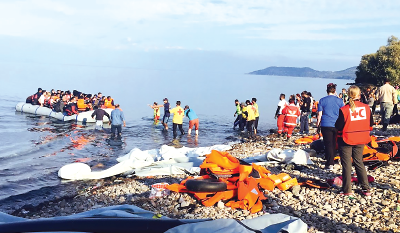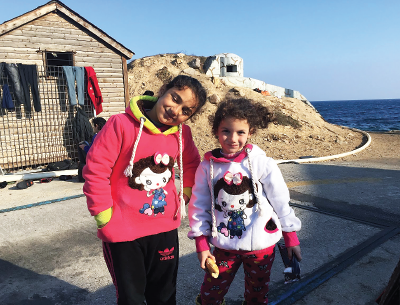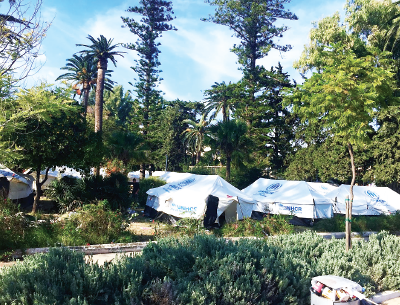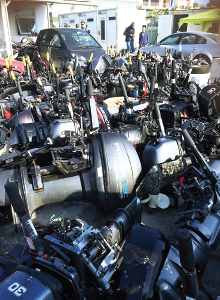GWU Group Helps Train Refugee Aid Workers
Abstract
Aid workers helping migrants in Greece get some critical backup to help them keep going.
Refugees fleeing wars in Syria and elsewhere in the Middle East have found temporary havens in camps in Lebanon, Jordan, Turkey, and Egypt. Many seek to move on to countries in Europe or North America and begin new lives.

Migrants who left Turkey in an inflatable boat approach shore on the Greek island of Chios, are greeted by relief workers. Many psychiatrists and mental health professionals are providing their services to help refugees recover from trauma.
For some time, the trail away from home led across Turkey to the edge of the Aegean Sea and then, often by precarious small boats, to the Greek islands of Lesbos, Chios, Kos, and Rhodes. There, Greek and other volunteers helped the refugees ashore, providing some initial care before they moved on across Greece and the Balkans to Central and Western Europe.
That rush took its toll on both the migrants and on the workers and volunteers helping them on the islands. In response, one American nongovernmental organization, Remote Area Medical, asked Allen Dyer, M.D., Ph.D., a professor of psychiatry at George Washington University (GWU), to go to Greece. Dyer had extensive experience building up psychiatric capacity in low-resource areas ranging from Appalachia to postinvasion Iraq and Afghanistan.
A prior commitment prevented his going then, but Catherine May, M.D., another veteran of crisis psychiatry in Haiti and post-Katrina Mississippi, went instead, along with GWU psychiatry PGY-4 Nicole Nguyen Perras, M.D., and former resident Sandeep Denduluri, M.D. The two had engaged in disaster preparation exercises while in GWU’s global mental health residency track and so were prepared for the trip to the Aegean.

“Laughter and play are still present among refugee children despite their long and arduous journeys,” said Nicole Perras, M.D., who traveled to Greece in 2015.
Remote Area Medical originally wanted someone to set up a psychiatric clinic and treat patients, said May, who is in private practice in Washington, D.C. “That’s easy to do with physical medicine but not with psychiatric services without people who speak the patients’ languages.”
Instead, May and her colleagues focused on needs assessment, concluding that the refugees would benefit less from formal psychiatric services than from community-scale projects to help them deal with the stresses they had and would experience.
“We saw that refugees had needs that were very different when they were in transit, as they were when in Greece, from when they were in camps,” she said. “When they’re in motion, they may have symptoms, but they don’t want to stop.”
At those times, it’s best to focus not on psychopathology but on resilience to keep them moving, she said. Health on the move means the health of the family group, not just that of an individual.

Empty refugee tents provided by the United Nations High Commissioner for Refugees remain in downtown Chios, Greece, after migrants were evacuated to the mainland.
When refugees are forced to stop, as they were when the Greek border crossing with Macedonia was closed in March 2016, they lose hope, she said. “Remove hope, and you get distress, despair, and violence.”
That same month, the U.S. Embassy in Athens asked Dyer to organize a training program for the humanitarian workers who had been helping refugees as they arrived on the Greek islands near Turkey. They were beginning to burn out from stress as the mass of refugees began to strain the entire system.
A two-day workshop, partly based on the Hope Modules used in the GWU residency program, was scheduled for June in the Greek capital to train the workers to care for themselves and then train their colleagues to better care for the refugees.
“Training the trainers was an important way to give humanitarian workers the skills to help refugees learn to process their own emotions,” said Dyer.
Dyer’s colleagues this time included May; Philip Candilis, M.D., director of the Forensic Psychiatry Fellowship at Saint Elizabeths Hospital in Washington, D.C.; Eric Kocher, J.D., an emergency medical technician; and Fatima Noorani, M.D., another psychiatry resident at GWU.
“We used a practical, case-based approach to help the workers deal with their feelings of helplessness and again be able to sit with refugees and instill some hope,” said Noorani in an interview.

Outboard motors used to propel inflatable boats across the sea from Turkey are warehoused in Greece for fear that reuse of the flimsy crafts will result in more deaths.
Aid workers clearly were the primary deliverers of mental health care, even if what they did was not actually clinical. So, the trainers from GWU began with short introductions to Psychological First Aid and mindfulness meditation to help them be more aware of their own feelings, both somatically and cognitively, said Dyer.
The GWU trainers invited their students to recreate internal “maps” of their own voyages, geographic or developmental, to imagine themselves in the position of the refugees they served.
Noorani understood that approach. She was born in India and came to the United States at age 19, although on a planned trip, not as a migrant who had lost everything.
“That was a challenging experience,” she recalled. “I can only imagine how stressful it is for the refugees.”
The lessons taught and absorbed on the shores of the Aegean have echoes elsewhere, said Dyer.
People usually take “global mental health” to mean “for other people” who live “over there,” with the greater stresses and limited resources, he said. “But in reality, it can be local anywhere: after a hurricane or in day-to-day poverty. And ‘global’ also means comprehensive care, not carved out as it is in the West. Health is health. It’s a more integrated view.” ■



